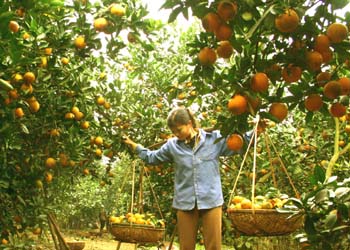
(HBO) –Since the first Cao Phong Orange Festival was held successfully, Cao Phong orange brand has gained a firm foothold in the market. With its typical flavour and quality farming, the specialty fruit of Muong Thang land has become popular, meaning that more and more tourists seek to visit orange orchards, opening up a new orientation to local ecotourism.
During the harvest season, it is easy to see ripe and
fruitful orange trees along a road from Hoa Binh city to Cao Phong, starting
from the top of Cun slope in Thu Phong commune to the centre of Cao Phong town.
Standing in the midst of a ripe orange garden, enjoying the pleasant orange
scent and fresh air, picking up and enjoying sweet and succulent orange pieces
are really an interesting experience luring visitors to Cao Phong.
Though newly-launched, orange orchard tourism has initially
brought about positive results. Not only strengthening consumers’ trust in Cao
Phong oranges and ensuring consumption, the experience has attracted a number
of visitors, contributing to increasing local income. Along a road running
through the centre of the town to the district, orchards like Thuy Nga (zone 4,
Cao Phong town), Thanh Loan (zone 2, Cao Phong town) and Ms Sen are crowded
thanks to hospitality of the owners. Consumers also feel secure when buying
oranges here because they are grown up to VietGAP standards.
Bui Tien Dung, head of the district Office of Culture and
Information, said that the total citrus cultivation area in the locality now
nears 2,100 ha with an annual output of over 23,000 tonnes, bringing in a
revenue of upwards 700 million VND per hectare. Visiting orchards, visitors
will have a chance to see farming process first-hand and enjoy "standard”
products instead of bad quality ones under the guise of Cao Phong trademark.
The number of vacationers has increased over years. In the first half of this
year, tourist arrivals was estimated at over 220,700, generating a revenue of
more than 15.8 trillion VND.
According to data from the Hoa Binh Provincial Party Committee, the industrial production index for the first six months of 2025 is estimated to have increased by 20% compared to the same period last year. This marks the highest year-on-year growth rate for this period since 2020.
In the first six months of 2025, Hoa Binh province’s export turnover was estimated at 1.145 billion USD, marking an 18.11% increase compared to the same period in 2024. Import turnover was estimated at $ 804 million, a 17.15% increase, which helped the province maintain a positive trade balance.
The lives of the ethnic minority farmers in Tan Lac district have gradually improved thanks to the new directions in agricultural production. This is a testament to the collective strength fostered through the professional associations and groups implemented by various levels of the district’s Farmers’ Union.
With the motto the "product quality comes first,” after nearly one year of establishment and operation, Muong village’s Clean Food Agricultural and Commercial Cooperative, located in Cau Hamlet, Hung Son Commune (Kim Boi district), has launched reputable, high-quality agricultural products to the market that are well-received by consumers. The products such as Muong village’s pork sausage, salt-cured chicken, and salt-cured pork hocks have gradually carved out a place in the market and they are on the path to obtaining the OCOP certification.
In the past, the phrase "bumper harvest, rock-bottom prices" was a familiar refrain for Vietnamese farmers engaged in fragmented, small-scale agriculture. But today, a new spirit is emerging across rural areas of Hoa Binh province - one of collaboration, organisation, and collective economic models that provide a stable foundation for production.
Maintaining growing area codes and packing facility codes in accordance with regulations is a mandatory requirement for agricultural products to be eligible for export. Recently, the Department of Agriculture and Environment of Hoa Binh province has intensified technical supervision of designated farming areas and packing facilities to safeguard the "green passport" that enables its products to access international markets.

